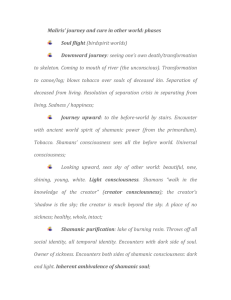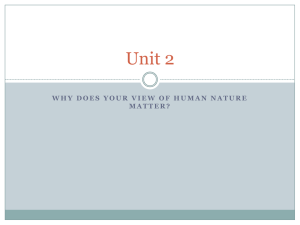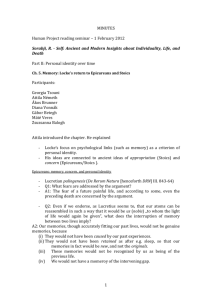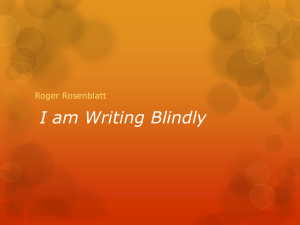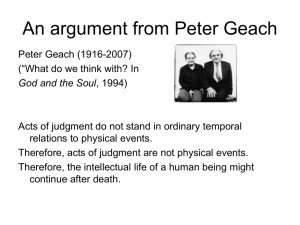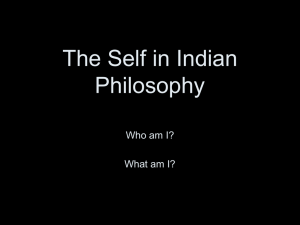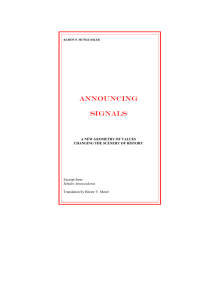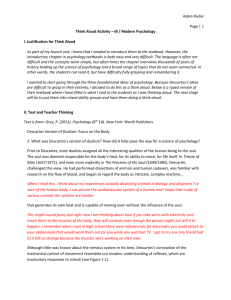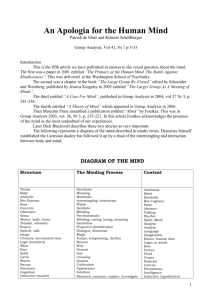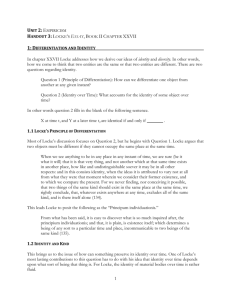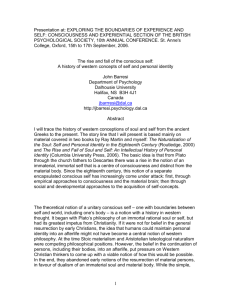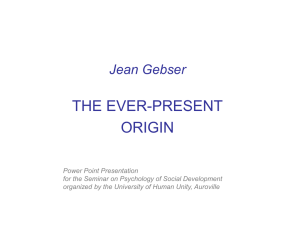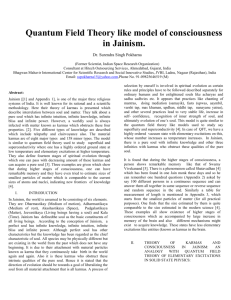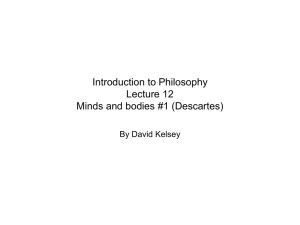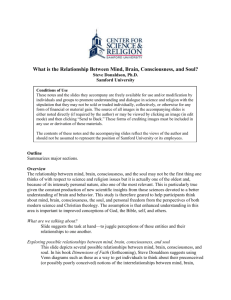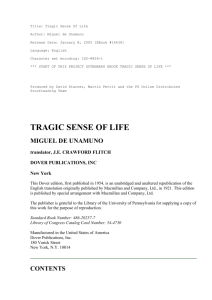Krohn presentation
advertisement
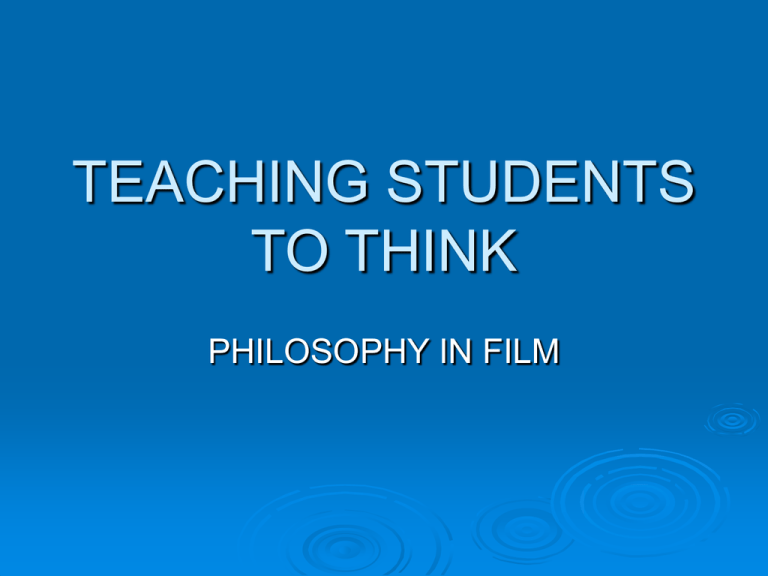
TEACHING STUDENTS TO THINK PHILOSOPHY IN FILM PHILOSOPHICAL IDEAS AND PHILOSOPHERS Two ways of incorporating philosophy into film: ideas and philosophers. Ideas: we do this anyway through theme. Just emphasise the philosophical ideas. Philosophers: find a philosopher whose ideas are explored. Explore that philosopher’s theories and then look at other philosophers that oppose those ideas. FREAKY FRIDAY THE PROBLEM OF PERSONAL IDENTITY HOW WOULD YOU FEEL IF YOU BECAME YOUR MOTHER? WHAT HAPPENS IN FREAKY FRIDAY? A busy psychologist and her imageconscious daughter are always arguing. Each one feels that the other one does not understand her point of view. Each one feels that the other one’s life is easier to live. They swap and are trapped in one another’s bodies. WHAT IS BEING SWAPPED? MIND BODY SOUL CONSCIOUSNESS IDENTITY PERSONALITY WHAT IS THE MIND? WHAT IS THE BODY? WHAT IS THE SOUL? WHAT IS CONSCIOUSNESS? WHAT IS IDENTITY? WHAT IS PERSONALITY? PHILOSOPHERS RENE DESCARTES The mind-body problem JOHN LOCKE The idea of consciousness RENE DESCARTES There are two main beliefs: 1. MATERIALISM: The mind is part of our brain; our thoughts and feelings are nothing more than physical processes taking place in our brain. All experiences are caused by our sensory organs sending electrical impulses to our brains. The mind is part of the body and they cannot be separated. CARTESIAN PHILOSOPHY 2. DUALISM: The mind is not part of our physical body and is separate from the brain. It interacts with the brain, but is not the same thing as the brain. Our thoughts, feelings, emotions etc. are something extra: something in addition to just physical impulses. We can therefore separate our minds and our brain. WHAT DO YOU BELIEVE? I believe that my mind is part of my brain. I believe that my mind is separate from my brain and body. I believe that my mind is the same as my soul. I believe in re-incarnation. I believe that my mind defines my identity. JOHN LOCKE: THE IDEA OF CONSCIOUSNESS Personal identity depends on consciousness. We are identified as the same person if we are conscious of our past and future thoughts and actions in the same way as we are conscious of our present thoughts and actions. A soul can be re-incarnated, but it is not a consciousness. Souls and Thoughts Souls are thinking substances. They are not thoughts; they are things that think. The relation between a soul and its thoughts can be likened to the relation between a pincushion and its pins. Just as a pincushion can have different pins in it at different times, the same soul can have different thoughts in it at different times. SOME PERSONAL IDENTITY PUZZLES The ship of Theseus Suppose that the planks in Theseus’s ship have been replaced one by one over the years until none of the original planks remained. Suppose further that the original planks were saved and put back into their original order. Which ship is identical to the original? SOME PERSONAL IDENTITY PUZZLES The brave Officer and the senile General A brave officer who skillfully stole a flag from an enemy also stole an apple from an orchard when he was a boy. As the officer ages, he becomes a senile general. As a senile general, he remembers stealing the flag, but does not remember stealing the apple. According to Locke, the senile general is identical to the brave officer, but not identical to the boy. SOME PERSONAL IDENTITY PUZZLES Locke’s Tale of the Prince and the Cobbler “For should the Soul of a Prince, carrying with it the consciousness of the Prince’s past life, enter and inform the Body of a Cobbler…every one sees, he would be the same Person with the Prince.” Thought Experiment: The King of China Suppose someone offered to make you the King of China on the condition that you lose all of your memories. In such a case, it’s doubtful that you would be around to enjoy the wealth even though, presumably, your soul would be. So having the same soul may not be a necessary condition for being the same person. SOME EXPRESSIONS ABOUT THE MIND What’s on your mind? Are you losing your mind? Are you out of your mind? A mind is a terrible thing to waste. You are always on my mind. Great minds think alike! Free your mind. It is a matter of mind over matter. in one's mind's eye in one's right mind know one's own mind Load off one's mind make up one's mind meeting of the minds never mind of two minds EXPRESSIONS ABOUT THE MIND bear in mind blow one's mind boggle the mind bring to mind call to mind cross one's mind change one's mind come to mind frame of mind go out of one's mind one-track mind on one's mind open mind out of sight (out of mind) piece of one's mind presence of mind prey on one's mind read someone's mind Put one's mind at rest slip one's mind speak one's mind AND EVEN MORE EXPRESSIONS… its all in your mind don't mind put your mind to it mind bending narrow minded messing with your mind mind games mind is like a sponge keep in mind OTHER FILMS THAT EXPLORE THIS IDEA… CAN YOU THINK OF ANY MORE? YEAR 9 FILMS Freaky Friday and the Problem of Personal Identity: Descartes, Locke, Reid. Philosophical puzzles: Ship of Theseus. Jurassic Meet Park and the Ethics of Cloning. the Robinsons: paradoxes of time travel. YEAR 10 FILMS Back to the Future and the Paradoxes of Time Travel. Any The Harry Potter: good vs. evil Day the Earth Stood Still: ecological ethics- Picard Year 11 Films The Matrix: Reality, Truth and Freedom. Plato, Baudrillard, Foucault, Descartes etc. A.I: What defines Life or Are Computers capable of independent thought and/or emotions? Turing test, Searle. YEAR 12 FILMS The Prestige: the ethics of cloning, identity Gattaca: Fate vs. Free will I-Robot: Can machines think? YEAR 13 FILMS Fight Club: Existentialism, Nihilism and Identity. Kierkegaard, Nietzsche Being John Malkovic: Existentialism, Cartesian Dualism Eternal Sunshine of the Spotless Mind: Kant and the morality of memory WHERE TO AFTER THAT? Encourage students to research a particular philosopher and his/her theories Or a particular idea and all the philosophies linked to that idea Then look at other texts that use the same ideas- evaluate to what extent Find similar ideas/theories in the texts you study


